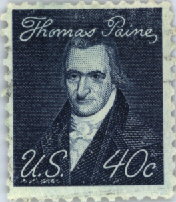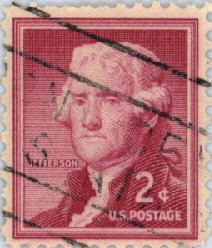Resolution Stiffens
As the months wore on, the difficulties of prosecuting a war while still part of the British empire became more and more apparent. No compromise came from England, and, on August 23, 1775, King George issued a proclamation declaring the colonies to be in a state of rebellion.
 Five months later, Thomas Paine published a
50-page pamphlet, Common Sense,
driving home in vigorous style the necessity
for independence. Paine, a political theorist who had come to
America from England in 1774, even dared to attack the sacred
person of the King, ridiculing the idea of hereditary monarchy
and declaring that one honest man was worth more to society
than "all the crowned ruffians that ever lived." Persuasively he
presented the alternatives - continued submission to a tyrannical
king and an outworn government or liberty and happiness as a
self-sufficient, independent republic. Circulated throughout the
colonies, the pamphlet helped to crystallize conviction and to rally
the undecided to the cause of separation.
Five months later, Thomas Paine published a
50-page pamphlet, Common Sense,
driving home in vigorous style the necessity
for independence. Paine, a political theorist who had come to
America from England in 1774, even dared to attack the sacred
person of the King, ridiculing the idea of hereditary monarchy
and declaring that one honest man was worth more to society
than "all the crowned ruffians that ever lived." Persuasively he
presented the alternatives - continued submission to a tyrannical
king and an outworn government or liberty and happiness as a
self-sufficient, independent republic. Circulated throughout the
colonies, the pamphlet helped to crystallize conviction and to rally
the undecided to the cause of separation.
For a map of the USA in 1775 click here
There still remained the task of gaining the approval of each colony to a formal declaration of separation. There was common agreement that the Continental Congress should take no such definitive step as independence without first receiving explicit instructions from the colonies. But the Congress daily heard of the establishment of other new extralegal colonial governments and of delegates being authorized to vote for independence. At the same time, the predominance of radicals in the Congress increased as they extended their correspondence, bolstered weak committees, and fired patriot minds with stirring resolutions.
 Finally, on May 10, 1776, a resolution to "cut the Gordian
knot" was adopted. Now only a formal declaration was needed.
On June 7, Richard Henry Lee of Virginia introduced a resolution
declaring in favor of independence, foreign alliances, and
American federation. Immediately, a committee of five, headed by
Thomas Jefferson of Virginia, was appointed to prepare a formal
declaration "setting forth the causes which
impelled us to this
mighty resolution."
Finally, on May 10, 1776, a resolution to "cut the Gordian
knot" was adopted. Now only a formal declaration was needed.
On June 7, Richard Henry Lee of Virginia introduced a resolution
declaring in favor of independence, foreign alliances, and
American federation. Immediately, a committee of five, headed by
Thomas Jefferson of Virginia, was appointed to prepare a formal
declaration "setting forth the causes which
impelled us to this
mighty resolution."
